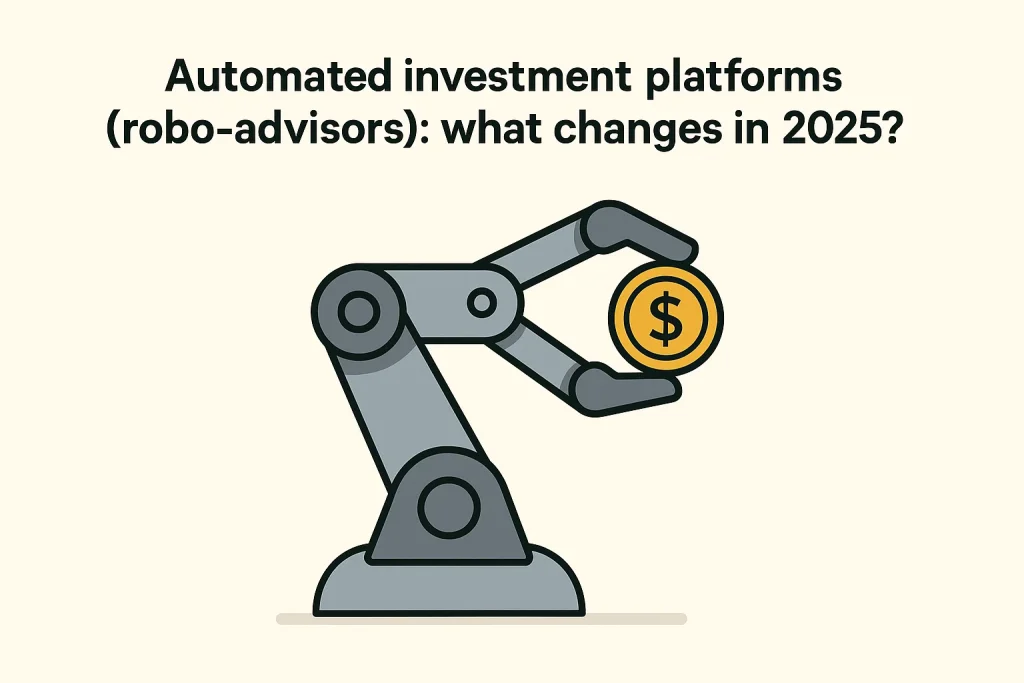In a world increasingly dominated by technology, automated investment platforms, commonly known as robo-advisors, have emerged as a revolutionary tool for managing finances. By 2025, the landscape of investments is expected to evolve significantly, adapting to new trends and technologies that will make investing more accessible than ever.
The seamless experience and the ability to make informed financial decisions without getting bogged down in complex jargon appeal to a broad audience. As we get closer to 2025, understanding the potential changes in this sphere is crucial for anyone interested in technology-driven financial solutions.
The rise of artificial intelligence in financial planning

As we move into 2025, the integration of artificial intelligence in financial planning is expected to rise significantly. AI is not only revolutionizing the way we approach investments, but it also provides personalized strategies tailored to individual preferences and financial situations. With its ability to process large datasets, AI can offer insights that might go unnoticed by traditional methods.
Furthermore, AI platforms can continuously learn and adapt to market changes, which allows for dynamic strategies that grow more precise over time. This technological advancement promises not only to make investing more efficient but also to enhance profitability by minimizing risks and uncovering new opportunities.
The role of machine learning in optimizing portfolios
Machine learning plays a critical role in the optimization of portfolios within automated investment solutions. By analyzing historical data and current market conditions, machine learning algorithms can predict future trends with a level of accuracy that surpasses human capabilities. This predictive power helps in constructing diversified portfolios that align with the investor’s risk tolerance and financial goals.
As these algorithms become more sophisticated by 2025, investors can expect improved personalization, with recommendations fine-tuned to match their investment profiles. The continual iteration of these algorithms ensures that investment strategies remain relevant and competitive in an ever-evolving financial market.
Enhanced user experience and accessibility
One of the main transformations anticipated in the realm of automated platforms by 2025 is the enhancement of user experience and accessibility. Integration with mobile applications and simplified interfaces are making these platforms more user-friendly, appealing to a broader audience without requiring users to have extensive financial expertise.
Moreover, the accessibility of these platforms means that more individuals can participate in financial markets, regardless of their initial investment knowledge or capital. This democratization of finance is not only leveling the playing field but also encouraging a culture of financial literacy and participation that benefits the economy as a whole.
Practical applications: how everyday investors benefit
For everyday investors, these improvements mean more than just convenience—they present an opportunity to closely align financial goals with personal values. Automated platforms offer tools that help investors shape their portfolios around industries they are passionate about or wish to support, such as sustainable or ethical investing.
Additionally, new features expected by 2025 will likely include real-time updates and educational resources that empower investors. By simplifying the complex world of finance, these platforms will continue to lower barriers to entry, enabling more people to benefit from investment opportunities traditionally reserved for insiders.
The future of automated financial services
As we look ahead to 2025, the future of automated financial services appears bright. The continuing integration of advanced technologies like artificial intelligence and machine learning is set to transform how people approach investments. By making these platforms more intuitive and personalized, they not only enhance the investing experience but also expand the reach to a broader demographic.
The anticipated advancements in this arena reflect a commitment to transforming the investment landscape into one that is more inclusive and efficient. As these platforms evolve, they will likely set new standards for how financial advisory services operate, offering unprecedented opportunities for wealth creation and financial independence.
